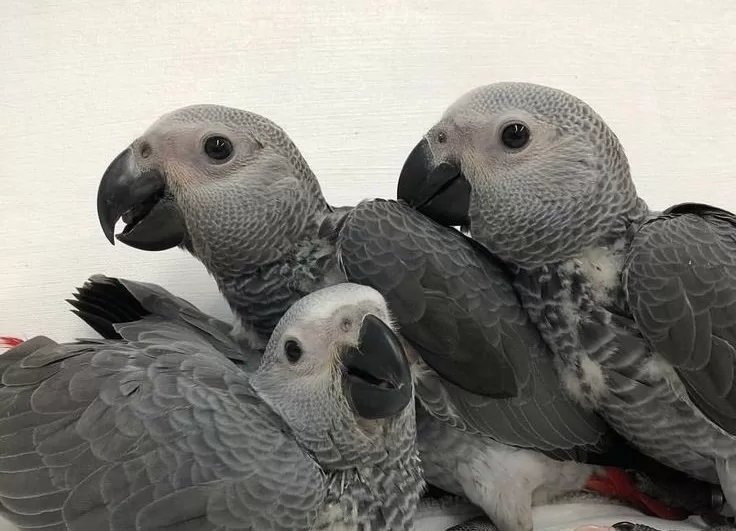Congratulations on your decision to become a first-time owner of African Grey chicks! These intelligent and sociable birds are known for their amazing mimicking abilities and playful personalities, making them great pets for bird lovers.
However, raising African Grey chicks can be a challenging task, especially if you lack experience in caring for birds. But don’t worry, this article will provide you with tips on how to raise African Grey chicks successfully.
Are you a first-time owner of African Grey chicks? Read on for tips on how to raise them successfully and ensure their healthy growth.
Tips for Raising African Grey Chicks
Creating a Comfortable Habitat
The first step to raising healthy African Grey chicks is to create a comfortable habitat for them. Here are some tips to ensure their living space is ideal:
- Choose the right cage: A spacious cage is essential for your African Grey chicks to move around and stretch their wings. Make sure the cage has enough space for perches, toys, and food and water bowls.
- Provide soft bedding: Line the cage with soft bedding materials, such as paper or wood shavings, to keep your chicks comfortable and warm.
- Maintain a warm temperature: African Grey chicks require a warm and humid environment to thrive. Keep the temperature between 75-80°F and humidity between 40-60%.
Feeding Your African Grey Chicks
African Grey chicks require a nutritious diet to support their growth and development. Here are some tips on what to feed them:
- Offer a variety of foods: African Grey chicks require a balanced diet consisting of fresh fruits, vegetables, nuts, and seeds. Offer a variety of foods to ensure they receive all the necessary nutrients.
- Provide fresh water: Make sure your chicks have access to fresh water at all times. Change the water daily and clean the water bowl regularly.
- Avoid toxic foods: Some foods can be toxic to African Grey chicks, including chocolate, caffeine, and avocado. Make sure to avoid feeding them these foods.
Socialization and Training
African Grey chicks are intelligent and social birds that require interaction and stimulation to thrive. Here are some tips on how to socialize and train your African Grey chicks:
- Spend time with your chicks: African Grey chicks require socialization and attention from their owners. Spend time talking, playing, and training them.
- Teach basic commands: African Grey chicks can learn basic commands, such as “step up” and “stay.” Use positive reinforcement to train them.
- Expose them to new experiences: Introduce your chicks to new experiences, such as new toys, perches, and sounds, to keep them stimulated and curious.
Health and Safety
Ensuring the health and safety of your African Grey chicks is crucial to their well-being. Here are some tips to keep them healthy and safe:
- Regular veterinary check-ups: Schedule regular check-ups with a bird veterinarian to ensure your chicks are healthy and free of any diseases.
- Keep the cage clean: Regularly clean the cage and replace the bedding to prevent the buildup of bacteria and other harmful microorganisms.
- Watch for signs of illness: Monitor your chicks for signs of illness, such as loss of appetite, lethargy, and difficulty breathing. Contact a veterinarian if you notice any of these symptoms.
Adopting African Grey Chicks: What to Expect and How to Prepare
If you are considering adopting an African Grey chick, it is important to understand the commitment and responsibility required to ensure a happy and healthy life for your new feathered companion. In this blog post, we will cover what to expect and how to prepare for adopting an African Grey chick.
Research and Select a Reputable Breeder
Your first step should be to find a reputable breeder who specializes in African Grey parrots. Make sure they are licensed and have a good reputation among other African Grey owners.
A good breeder will provide you with information about the bird’s lineage, health, and temperament, as well as any potential genetic issues that could impact the parrot’s well-being.
Understanding the Time Commitment
African Grey parrots have long lifespans – often living between 50 and 70 years or even up to 80 years if looked after well. It is essential to consider if you are willing and able to provide a lifelong home for your new companion. These birds require daily interaction and mental stimulation to stay happy and healthy, so ensure you can allocate sufficient time for socializing, training, and playtime.
Preparing Your Home
Before bringing your African Grey chick home, it is essential to prepare a safe and suitable environment. Some key considerations include:
- Cage: As I said above also, invest in a large, sturdy cage that allows your bird to spread its wings fully and climb around with ease. Ensure there are no gaps or sharp edges that could cause injury.
- Toys and Perches: African Greys are intelligent and need mental stimulation. Provide a variety of toys, such as puzzles, foraging toys, and chewables. Include natural wood perches of varying thicknesses to help with foot health.
- Location: Choose a location in your home that is free from drafts, direct sunlight, and excessive noise. Your bird should be able to see and interact with family members but not feel overwhelmed.
Diet and Nutrition
African Grey chicks require a balanced and varied diet for optimal health. In addition to a high-quality pelleted food, provide a variety of fresh fruits, vegetables, and healthy grains. Consult with an avian veterinarian to ensure you are meeting your bird’s specific dietary needs.
Health and Wellness
Routine veterinary care is essential for your African Grey’s well-being. Establish a relationship with an avian veterinarian who is experienced in working with African Greys. Regular check-ups, vaccinations, and preventative care will help ensure your bird stays healthy and happy.
Socialization and Training
African Grey chicks are intelligent and receptive to training. Start socializing and handling your bird as soon as it arrives home to create a strong bond. Teach basic commands like “step up” and “step down” and use positive reinforcement techniques to encourage good behavior. Remember to be patient and consistent in your training efforts.
Potential Challenges
African Greys can be sensitive and prone to stress. Be prepared to address issues such as feather plucking or excessive screaming by providing consistent care, mental stimulation, and a stable environment. If problems persist, consult with an avian veterinarian or behaviorist for guidance.
Summary
Adopting an African Grey chick is a rewarding experience that comes with significant responsibility. I would say by researching and preparing for this life-long commitment, you will be well-equipped to provide a loving and nurturing home for your new feathered family member. Remember, patience, consistency, and understanding are key to a successful relationship with your African Grey parrot.
Below I have written some of the most frequently asked questions:-
FAQs (Frequently Asked Questions)
- Q: How often should I feed my African Grey chicks?
A: African Grey chicks require frequent feedings, typically every 2-3 hours. As they grow, you can gradually decrease the frequency of feedings. - Q: Can African Grey chicks be trained to talk?
A: Yes, African Grey chicks can be trained to talk, and they are known for their impressive mimicking abilities. However, it requires consistent training and patience to teach them to talk. - Q: How can I tell if my African Grey chicks are sick?
A: Watch for signs of illness, such as loss of appetite, lethargy, and difficulty breathing. Changes in behavior or appearance can also indicate illness. It’s essential to seek veterinary care if you notice any of these symptoms. - Q: Can I keep African Grey chicks with other birds?
A: African Grey chicks are social birds and can be kept with other birds. However, it’s essential to ensure that the birds are compatible and that the cage is spacious enough to accommodate all of them. - Q: How long does it take for African Grey chicks to start talking?
A: African Grey chicks typically start vocalizing at around three months of age, but it can take several months to a year or more for them to start speaking clearly. - Q: Do African Grey chicks need to be hand-fed?
A: Yes, African Grey chicks require hand-feeding for the first few weeks of life until they are weaned onto solid food. - Q: How often should I clean my African Grey chick’s cage?
A: African Grey chick’s cages should be cleaned regularly, ideally once a week or more frequently if the cage becomes soiled. - Q: Can African Grey chicks be housed outside?
A: No, African Grey chicks should not be housed outside as they require a warm and humid environment to thrive. - Q: How much exercise do African Grey chicks need?
A: African Grey chicks require regular exercise and playtime outside of their cage to prevent boredom and promote physical and mental stimulation. - Q: How do I know if my African Grey chicks are male or female?
A: It can be difficult to determine the sex of African Grey chicks without DNA testing or surgical sexing, which should only be performed by a veterinarian. - Q: Can African Grey chicks be potty trained?
A: Yes, African Grey chicks can be potty trained using positive reinforcement techniques. - Q: What toys are safe for African Grey chicks?
A: Safe toys for African Grey chicks include wooden blocks, foraging toys, and puzzle toys. Avoid toys with small or loose parts that could be swallowed. - Q: Can African Grey chicks fly?
A: Yes, African Grey chicks can fly once they develop their flight feathers. However, it’s essential to provide a safe and enclosed environment for them to prevent injury or escape. - Q: Do African Grey chicks need a specific type of water?
A: No, African Grey chicks do not require a specific type of water, but it’s essential to provide fresh and clean water at all times. Avoid using chlorinated or fluoridated water. - Q: How long do African Grey chicks live?
A: African Grey chicks can live for up to 50-60 years or even up to 80 years with proper care and attention. - Q: How much should I handle my African Grey chicks?
A: African Grey chicks should be handled regularly but not excessively. Overhandling can cause stress and illness. - Q: What should I do if my African Grey chicks become aggressive?
A: Aggressive behavior in African Grey chicks can be a sign of stress or illness. Seek veterinary care and consult with a bird behaviorist for assistance. - Q: Can African Grey chicks be trained to do tricks?
A: Yes, African Grey chicks can be trained to perform a variety of tricks using positive reinforcement techniques. - Q: What should I do if my African Grey chicks stop eating?
A: Loss of appetite can be a sign of illness in African Grey chicks. Seek veterinary care immediately if your chicks stop eating. - Q: How can I prevent my African Grey chicks from becoming bored?
A: Provide a variety of toys, perches, and stimulation to keep your African Grey chicks entertained and mentally stimulated. - Q: How often should I bathe my African Grey chicks?
A: African Grey chicks do not require frequent bathing as they are naturally clean birds. However, you can offer them a shallow dish of water for bathing as needed. - Q: Can African Grey chicks be trained to wear a harness?
A: Yes, African Grey chicks can be trained to wear a harness for outdoor activities using positive reinforcement techniques. - Q: What should I do if my African Grey chicks start plucking their feathers?
A: Feather plucking can be a sign of stress or illness in African Grey chicks. Seek veterinary care immediately if you notice this behavior. - Q: Do African Grey chicks require a lot of attention?
A: Yes, African Grey chicks require a lot of attention and socialization from their owners to thrive. They can become bored and develop behavioral problems if left alone for extended periods.
My Final Thoughts
Raising African Grey chicks can be a rewarding experience, but it requires dedication and effort. By creating a comfortable habitat, providing a nutritious diet, socializing and training your chicks, and ensuring their health and safety, you can raise healthy and happy African Grey chicks.
Remember to seek veterinary care if you notice any signs of illness or if you have any concerns about your chicks’ health. With proper care and attention, your African Grey chicks can become loyal and loving companions for years to come. Good luck and enjoy your journey as a first-time owner of African Grey chicks!
If you found this blog helpful, It would be great if you could share it with your family and friends who might find it useful as well.
You might like to read these as well
African Grey Parrots: The Ultimate Guide to Care and Training
African Grey Parrot Male or Female? (Determine Gender of African Grey)
The Surprising Benefits of Owning an African Grey Parrot
Understanding of Grey Parrot’s Body Language
The Importance of a Cage for Your African Grey Parrot
Mastering the Art of Taming an African Grey Parrot
Is Your African Grey a Jealous Bird? Here’s What You Need to Know!
The Mesmerizing Eyes of African Grey Parrot & What They Can Tell
Unlock the Secrets of Choosing the Perfect African Grey Parrot
The Battle of the Birds: African Grey Parrot vs Macaw
Winning Parrot Names: How to Choose a Name That Strengthens Your Bond
The Secret Life of African Grey Parrots: What You Need to Know Before Owning One
For more useful content about African grey parrots, you can subscribe my site with your email to get notification upon publishing a new blog, the subscribe box you can see on the right side of this page. Also if you get an alert on your web browser while browsing my site, allow it and that will also give you an alert whenever I publish a new blog.
Stay safe and much love !






